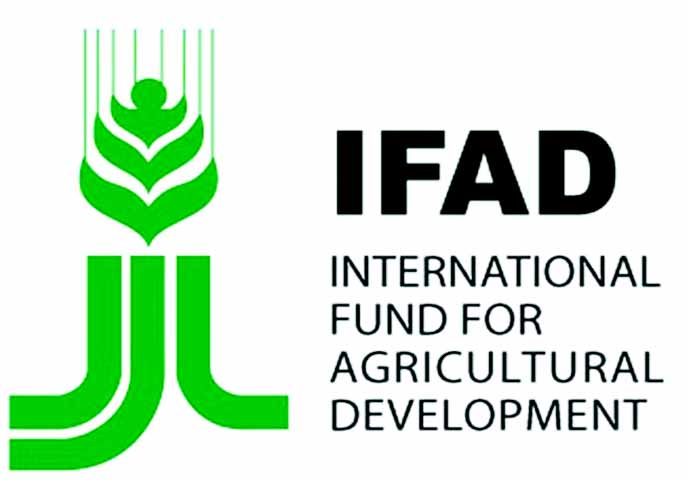
Business Desk :
The International Fund for Agricultural Development (IFAD) and the government of Bangladesh have signed an agreement to launch a project to accelerate inclusive economic growth, sustainably reduce poverty and improve food and nutrition security for 445,000 rural families.
The financing agreement for the Rural Microenterprise Transformation Project was signed by IFAD President Gilbert F Houngbo and Secretary of the Economic Relations Division (ERD) Monowar Ahmed, said a press release.
The total cost of the project is US$200 million, of which IFAD is providing an US$80 million loan and US$1 million grant. The remaining costs will be covered by the implementing agency Palli Karma-Sahayak Foundation (US$13 million), the beneficiaries themselves (US$0.9 million) and collaborating entities in the private sector, partner organisations and non-bank financial institutions (US$96.8 million).
Poverty rates in Bangladesh have decreased from 49 percent in 2000, to 24.3 percent in 2016. In spite of this impressive progress, an estimated 40 million people still live below the poverty line. Rural poverty remains higher than urban poverty, and agriculture accounts for only 15.4 percent of the GDP, but employs 41 percent of the population.
According to Omer Zafar, country director of IFAD in Bangladesh, the key drivers constraining the agriculture sector are farmers’ limited access to what they need- updated technology, viable markets, and financial services.
“Millions of small farmers and micro entrepreneurs are unable to transition from semi-subsistence farming to commercial operations. A wide range of underlying causes hampers this transition process, among them low productivity, outdated technologies, lack of differentiated produce, poor quality of output, limited processing to add value, inadequate advisory services, insufficient access to financial services and the absence of structured markets,” said Zafar.
This new project aims to respond to these challenges by boosting the agribusiness sector and increasing the overall profitability of farming by integrating food production with selected agriculture value chains.
Focusing on the districts of Chattogram, Khulna, Rajshahi and Rangpur, the project will offer small-scale farmers and micro entrepreneurs access to improved production technologies, financial services and market linkages.
“The project will create synergy between producers and agribusinesses, enabling sustained income growth and employment creation,” Zafar added.
The project will also organise and train producers to have the necessary skills to meet food safety standards, enabling them to increase the quantity and improve the quality of their output. This will also ensure higher-quality produce is available for agribusinesses.
The project is in line with Bangladesh’s National Agriculture Policy which aims to accelerate the transformation from semi-subsistence to commercial agriculture through productivity gains diversification, value addition and agro processing. Since 1978, IFAD has financed 34 rural development programmes and projects in Bangladesh, benefitting almost 12 million households, with a total cost US$ 2.3 billion, of which IFAD has invested US$913 million.
The International Fund for Agricultural Development (IFAD) and the government of Bangladesh have signed an agreement to launch a project to accelerate inclusive economic growth, sustainably reduce poverty and improve food and nutrition security for 445,000 rural families.
The financing agreement for the Rural Microenterprise Transformation Project was signed by IFAD President Gilbert F Houngbo and Secretary of the Economic Relations Division (ERD) Monowar Ahmed, said a press release.
The total cost of the project is US$200 million, of which IFAD is providing an US$80 million loan and US$1 million grant. The remaining costs will be covered by the implementing agency Palli Karma-Sahayak Foundation (US$13 million), the beneficiaries themselves (US$0.9 million) and collaborating entities in the private sector, partner organisations and non-bank financial institutions (US$96.8 million).
Poverty rates in Bangladesh have decreased from 49 percent in 2000, to 24.3 percent in 2016. In spite of this impressive progress, an estimated 40 million people still live below the poverty line. Rural poverty remains higher than urban poverty, and agriculture accounts for only 15.4 percent of the GDP, but employs 41 percent of the population.
According to Omer Zafar, country director of IFAD in Bangladesh, the key drivers constraining the agriculture sector are farmers’ limited access to what they need- updated technology, viable markets, and financial services.
“Millions of small farmers and micro entrepreneurs are unable to transition from semi-subsistence farming to commercial operations. A wide range of underlying causes hampers this transition process, among them low productivity, outdated technologies, lack of differentiated produce, poor quality of output, limited processing to add value, inadequate advisory services, insufficient access to financial services and the absence of structured markets,” said Zafar.
This new project aims to respond to these challenges by boosting the agribusiness sector and increasing the overall profitability of farming by integrating food production with selected agriculture value chains.
Focusing on the districts of Chattogram, Khulna, Rajshahi and Rangpur, the project will offer small-scale farmers and micro entrepreneurs access to improved production technologies, financial services and market linkages.
“The project will create synergy between producers and agribusinesses, enabling sustained income growth and employment creation,” Zafar added.
The project will also organise and train producers to have the necessary skills to meet food safety standards, enabling them to increase the quantity and improve the quality of their output. This will also ensure higher-quality produce is available for agribusinesses.
The project is in line with Bangladesh’s National Agriculture Policy which aims to accelerate the transformation from semi-subsistence to commercial agriculture through productivity gains diversification, value addition and agro processing. Since 1978, IFAD has financed 34 rural development programmes and projects in Bangladesh, benefitting almost 12 million households, with a total cost US$ 2.3 billion, of which IFAD has invested US$913 million.

